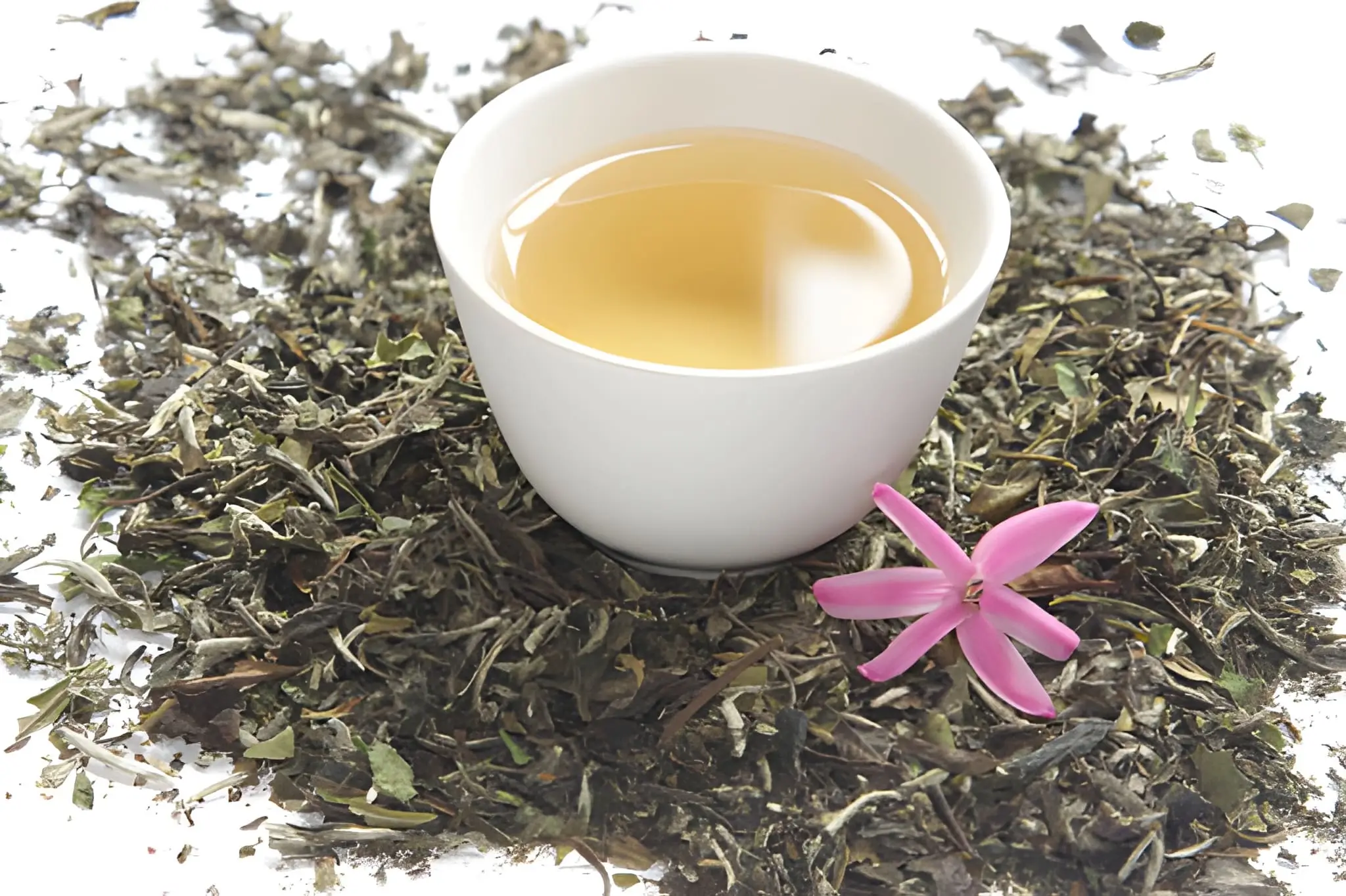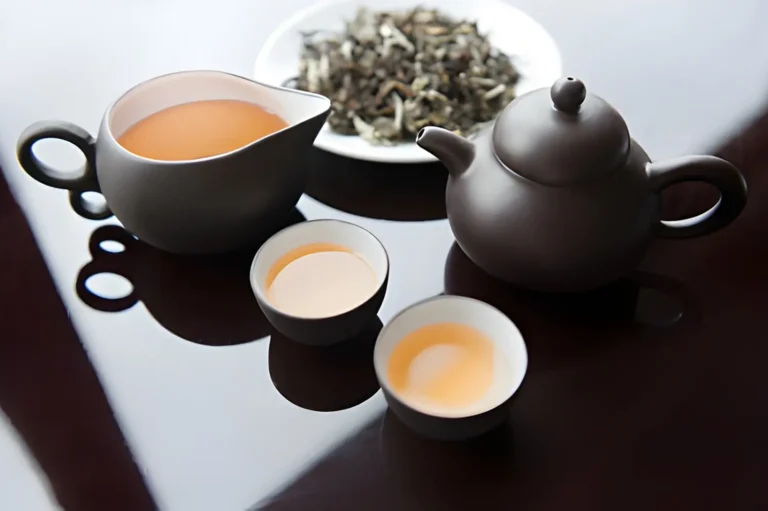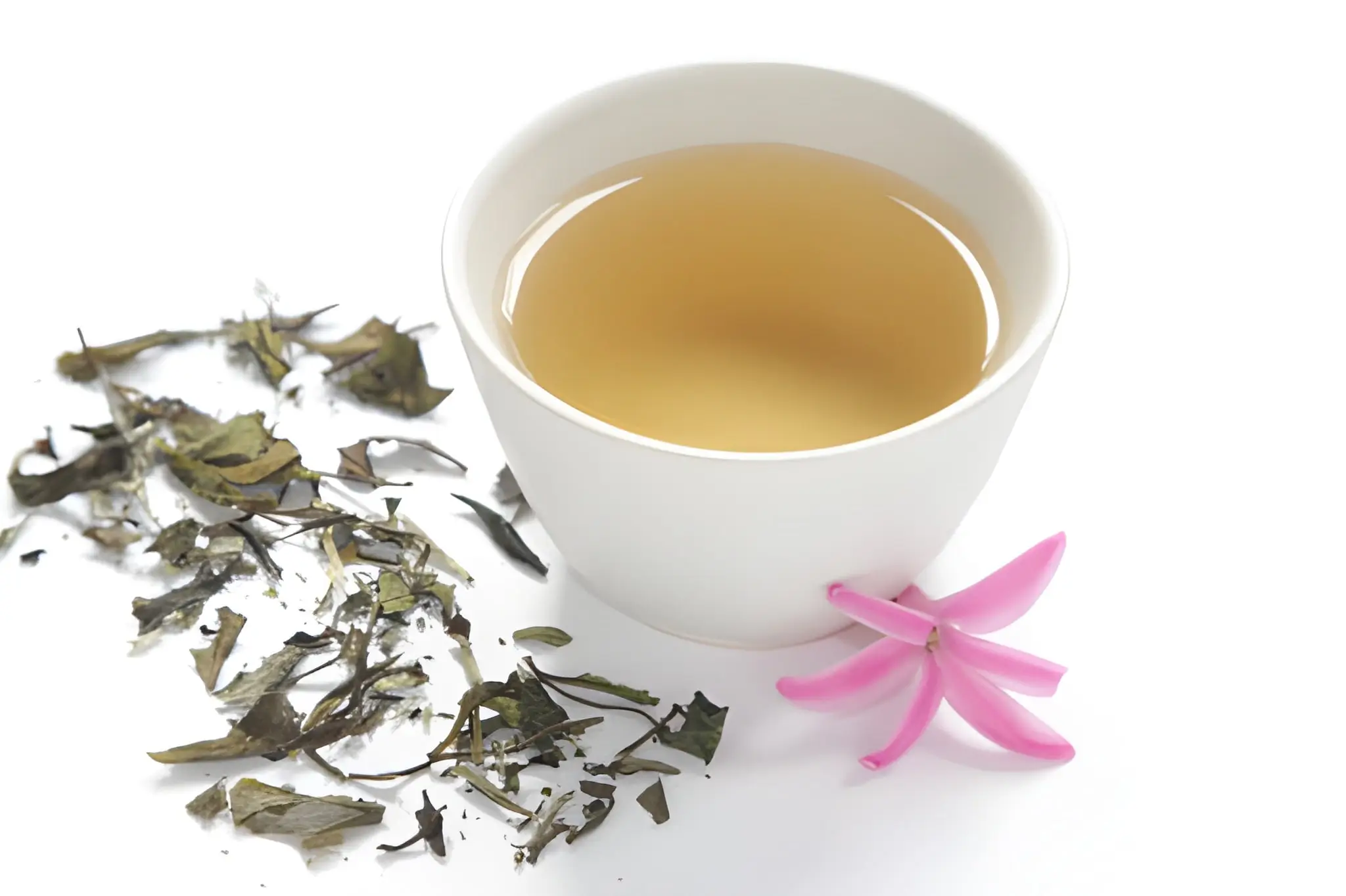According to the Harvard School of Public Health, “54% of Americans over the age of 18 drink coffee every day”, with an average of 3.1 cups a day, totaling an annual spend of $40 billion. Though the benefits of caffeine have been confirmed study after study, the high cost and sugar content of caffeinated drinks combined with their addictive properties, are pushing individuals to look for alternative, healthier drinks. Healthy tea, and white tea in particular, has become a popular topic as more people try to kick the coffee habit.
What is White Tea
White tea is a delicate type of tea made from the young leaves and buds of the Camellia sinensis plant. What makes it unique is how it’s harvested early – usually in spring – and processed very minimally to preserve its natural properties. This approach helps retain its soft flavor and high levels of antioxidants, particularly polyphenols, which can provide various health benefits.
The name “white tea” comes from the fine white hairs that cover the new buds. Most true white tea comes from a specific variety of tea plants grown in China’s Fujian province, where conditions are ideal for its production. Because of its light taste and natural compounds, white tea is often considered one of the purest forms of tea.

White Tea Types
- White Ambrosia Tea. White Ambrosia is a modern blend that typically mixes delicate white tea leaves with coconut shavings and vanilla or tropical fruit infusions. The base is often a Silver Needle or White Peony. This tea offers a naturally sweet, creamy flavor with a soft floral finish.
- White Peony Tea (Bai Mudan). White Peony is made from both young tea buds and the first few leaves after they open. It’s slightly stronger than Silver Needle, with a richer flavor profile that balances sweetness with light earthiness. This tea has a golden hue and is often described as floral, nutty, and slightly fruity. It’s widely grown in China.
- Silver Needle White Tea (Bai Hao Yinzhen). Silver Needle is the most famous variety of white tea, made only from unopened buds covered in soft, silvery hairs. It is grown primarily in the Fujian province and harvested early in the spring. The taste is very delicate – light, sweet, and slightly floral with almost no bitterness.
- Tribute Eyebrow Tea (Gong Mei). Tribute Eyebrow, also called Gong Mei, is picked slightly later than Silver Needle and White Peony, giving it a deeper flavor. It has a fuller body with woody and fruity undertones, often compared to light oolong teas. Grown mainly in Fujian and Guangxi provinces, it’s a good option for tea drinkers who enjoy a stronger cup without the intensity of green or black teas.
- Long Life Eyebrow (Shou Mei). Long Life Eyebrow tea is made from the leftover leaves after the premium white teas have been harvested. Because it’s picked later in the season, it has a “tougher” flavor – earthy, slightly astringent, and darker in color. Though it’s considered a lower grade compared to Silver Needle or White Peony, it’s still popular because of its depth and affordability.
- Ceylon White Tea. Ceylon White comes from Sri Lanka and is one of the rarer white teas available. It’s made using long silver buds that are carefully sun-dried. The flavor is soft and refreshing, with honey-like sweetness and some floral notes. Because of its rarity and unique origin, it’s often considered a luxury tea.
What are the Benefits of White Tea
White tea is more than just a light and refreshing drink – it’s also packed with natural compounds that can be highly beneficial for your health. From skin health to heart protection, this minimally processed tea offers a surprising range of potential white tea benefits. Below, we’ll tell you about some of the most talked-about reasons people choose to drink white tea.
1. Rich in Antioxidants
One of the biggest benefits of white tea is that it is full of antioxidants that help protect your cells from damage. These white tea antioxidants fight off free radicals, which are unstable molecules linked to aging and health problems like heart disease or diabetes. Because white tea is so lightly processed, it retains more of these helpful compounds than many other teas. Drinking it regularly may help your body handle everyday stress better.
2. Supports Heart Health
Health benefits of white tea include heart health. Its antioxidants and polyphenols can help relax blood vessels and support better blood circulation. Some studies suggest that people who drink white tea regularly may lower their risk of heart disease. Adding white tea to your routine is a simple way to show your heart a little care.
3. May Promote Weight Loss
One of the benefits of drinking white tea is that it can help your body burn fat a little faster. It contains caffeine and a compound called EGCG, both known for supporting metabolism and breaking down fat. A test-tube study suggests it could help increase calorie burn by a small percentage each day. It may also help your body absorb nutrients better, which supports your overall health while you’re trying to lose weight.
4. Good for Skin Health
White tea can be a nice boost for your skin. It’s packed with antioxidants that help protect your skin from free radicals – things that speed up aging and cause wrinkles. White tea benefits for skin can help your skin stay firm and smooth for longer. It might also support healthy cell turnover and reduce inflammation, which could mean fewer breakouts and a clearer look.
5. Helps With Hair Health
White tea benefits for hair include EGCG, a natural compound that may support hair growth and help reduce hair thinning. It’s known for fighting off damage that can affect both your scalp and hair. Some studies also show that EGCG might help treat scalp issues that don’t respond well to other treatments. If you’re looking for a gentle, natural way to care for your hair, regularly drinking white tea might be a good idea.
6. Supports Oral Health
White tea may help protect your teeth and gums. It has natural compounds like fluoride and tannins, which can strengthen enamel and fight bacteria that cause cavities and gum issues. Its anti-inflammatory effects also support healthier gums. Plus, another benefit of white tea is that it doesn’t stain your teeth the way coffee can, preserving your beautiful smile.
7. May Help Fight Cancer
A double test-tube study suggests that white tea might help the body fight cancer. Studies have looked at how white tea extract may slow the growth of cancer cells, especially in the colon. It can also protect healthy cells from damage. Early results are promising and show that white tea could be one small part of a healthy lifestyle that helps lower long-term risk.
8. Improves Brain Function
White tea contains L-theanine, a natural compound known to support focus and mental clarity. It may help you stay alert while feeling calm at the same time. This makes it a great drink when you’re studying or need to concentrate without the jitters of coffee. It can also lower stress because of how it supports the brain’s GABA activity. If you want to boost your brain without overdoing it, a cup of white tea could help.
9. May Lower Risk of Insulin Resistance
The benefits of white tea extend to blood sugar levels. The polyphenols in it lower the risk of insulin resistance, which is often a step toward developing type 2 diabetes. By supporting healthy insulin function, white tea can play a small, but important part in keeping blood sugar stable. It’s not a cure or replacement for medical care as is, and including it as part of a balanced diet could be a simple way to support your health.
10. Supports Bone Health
White tea can help keep your bones strong as you age. Some of its natural compounds, like catechins, slow down the breakdown of bone cells. This organic white tea benefit can support better bone density and lower the risk of conditions like osteoporosis. It’s a simple way to give your bones a little extra care – especially if you’re already focusing on a healthy lifestyle.
White Tea vs. Other Types of Tea
White tea may be the most delicate of all “true teas,” but it still holds its own when compared to green, black, oolong, and pu-erh teas. While all of them come from the same plant, the way they’re harvested and processed makes a big difference in their flavor, appearance, and benefits. Below, we’ll take a closer look at how white tea health benefits stack up against its popular counterparts.
White Tea vs Green Tea
White tea and green tea both come from the same plant, but they’re processed differently. White tea is made from young leaves and buds, which are simply withered and dried, keeping their natural form and delicate flavor. Green tea, on the other hand, is usually steamed or pan-fired to stop oxidation, giving it a more complex taste. White tea has a light, smooth flavor and lacks bitterness, while green tea can have stronger grassy or vegetal notes. White tea also tends to have more antioxidants, especially catechins.
White Tea vs Black Tea
White tea is made from young leaves that are gently dried with minimal handling, while black tea is fully oxidized. This longer process gives black tea its dark color and bold flavor, often with earthy or malty notes. While white tea stays light, smooth, and more delicate. Both teas contain antioxidants, but white tea usually has more due to less processing. That’s why some people consider it a healthier option compared to black tea.
How to Brew White Tea for Maximum Benefits
To brew white tea and keep its health benefits, you need to be gentle. Start by placing 1 teaspoon of loose white tea leaves in a teapot. Heat water to around 185°F(not boiling), then pour about 200 ml (or 7 fl oz) over the leaves. Let it steep for about 5 minutes — no rushing. Strain and enjoy. Avoid overheating or over-steeping, as white tea is delicate and too much heat can harm its flavor. This slow, careful method gives you the best taste and preserves its antioxidants.
Are There Any White Tea Side Effects to Consider?
White tea is usually safe for most people, but there are a few things to watch out for. It does contain caffeine, which may cause sleep problems, dizziness, or anxiety in sensitive individuals. Drinking too much can also upset your stomach. If you’re pregnant or breastfeeding, be extra cautious — some white tea products can contain trace amounts of lead, especially those in tea bags. As with anything, moderation is key. If you’re unsure, especially because of a health condition or sensitivity, it’s best to talk to a healthcare provider first.
Conclusion
White tea offers a wide range of potential benefits, from supporting heart health to helping with weight management, skin, and mental clarity. It’s not a cure-all, but adding it to your daily routine can be a simple and enjoyable way to improve your health in many ways. Just remember to stay mindful of caffeine sensitivity and always choose high-quality sources.
At Pulse Acupuncture, they focus on real, everyday ways to help you feel better. Alongside herbal treatments, they offer acupuncture in Williamsburg, Brooklyn and acupuncture in Clifton, NJ to help with pain relief, stress, and overall health. Their treatments may also include cupping, moxibustion, and Tui Na Massage in Williamsburg, Brooklyn – hands-on techniques that help relax muscles and help with blood circulation.
They also provide herbal medicine in Brooklyn as part of their approach. You don’t need to do everything at once – just start with what feels right for you, and they’ll help you from there.
Read also:
-
Marina Doktorman, M.S., L.Ac., is an experienced acupuncturist who obtained her Masters of Acupuncture from the Tri-State College of Acupuncture in New York City in 2001. During her studies, she focused on Chinese Herbology, a branch of Traditional Chinese Medicine (TCM) that utilizes herbs to complement acupuncture treatments. Marina is licensed in both New York (NY) and New Jersey (NJ) and holds a Diplomate of Acupuncture from the National Certification Commission for Acupuncture and Oriental Medicine (NCCAOM), indicating her expertise in the field.






